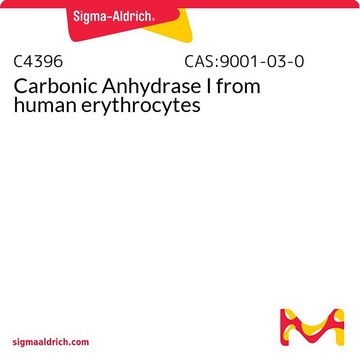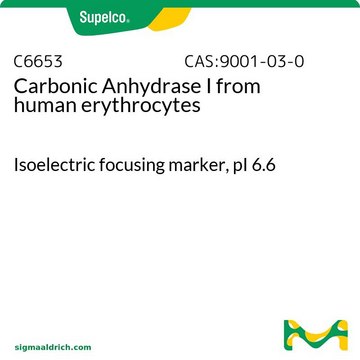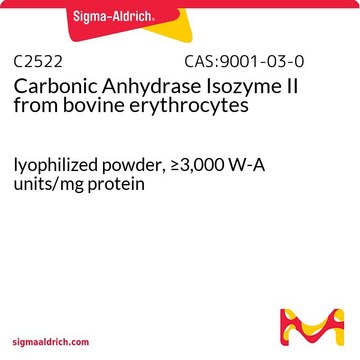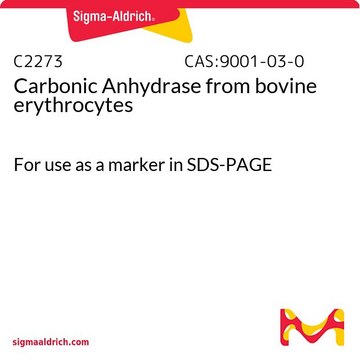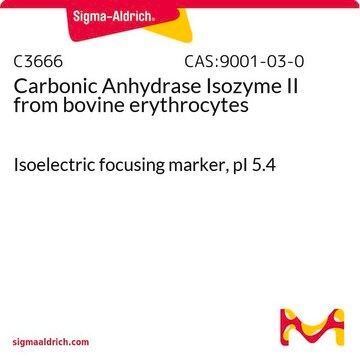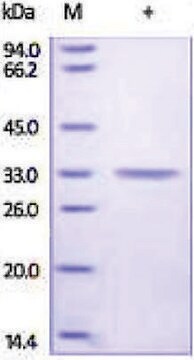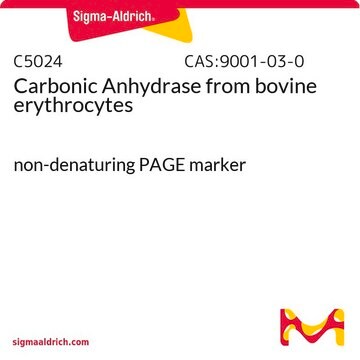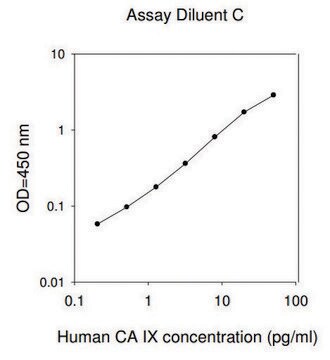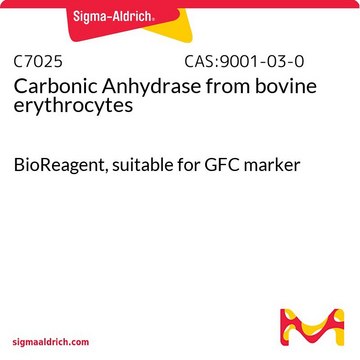C6624
Carbonic Anhydrase II human
recombinant, expressed in E. coli, buffered aqueous solution
Sinônimo(s):
CA-II, CA2, Carbonic Anhydrase 2
Faça loginpara ver os preços organizacionais e de contrato
About This Item
Número MDL:
Código UNSPSC:
12352204
NACRES:
NA.54
Produtos recomendados
recombinante
expressed in E. coli
Nível de qualidade
Formulário
buffered aqueous solution
atividade específica
≥5,000 units/mg protein
peso molecular
large subunit 17-22 kDa
small subunit 10-12 kDa
concentração
800-1000 μg/mL
Condições de expedição
wet ice
temperatura de armazenamento
−20°C
Informações sobre genes
human ... CA2(760)
Aplicação
Human carbonic anhydrase II has been used in a study to assess quantitative imaging of mitochondrial and cytosolic free zinc levels in an in vitro model of ischemia/reperfusion. Human carbonic anhydrase II has also been used in a study to investigate a new scrubber concept for catalytic CO2 hydration.
Ações bioquímicas/fisiológicas
Carbonic anhydrase is a zinc metalloenzyme that catalyzes the hydration of carbon dioxide to carbonic acid. It is involved in vital physiological and pathological processes such as pH and CO2 homeostasis, transport of bicarbonate and CO2, biosynthetic reactions, bone resorption, calcification, and tumorigenicity. It is required for renal acidification. Its absence can lead to osteoporosis, renal tubular acidosis, and cerebral calcification. Therefore, this enzyme is an important target for inhibitors with clinical applications in glaucoma, epilepsy and Parkinson′s disease. In addition, it is being explored as a potential target for obesity and cancer. CAII has a molecular mass of approximately 30 kDa and is primarily present in type II pneumocytes. Due to this unique location it has been speculated that CAII is involved in pulmonary functions such as regulation of fluid secretion and facilitation of CO2 elimation. Sulfonamides, sulfamates and sulfamides are potent inhibitors of CA.
Definição da unidade
One Wilbur-Anderson (W-A) unit will cause the pH of a 0.02 M Trizma buffer to drop from 8.3 to 6.3 per min at 0 °C. (One W-A unit is essentially equivalent to one Roughton-Booth unit.)
forma física
Supplied as a solution in 20 mM Tris, pH 7.5, with 150 mM NaCl.
Código de classe de armazenamento
10 - Combustible liquids
Escolha uma das versões mais recentes:
Já possui este produto?
Encontre a documentação dos produtos que você adquiriu recentemente na biblioteca de documentos.
Os clientes também visualizaram
Samira Ranjbar et al.
International journal of biological macromolecules, 50(4), 910-917 (2012-02-22)
This study reports the interaction between furosemide and human carbonic anhydrase II (hCA II) using fluorescence, UV-vis and circular dichroism (CD) spectroscopy. Fluorescence data indicated that furosemide quenches the intrinsic fluorescence of the enzyme via a static mechanism and hydrogen
Bryan J McCranor et al.
Journal of bioenergetics and biomembranes, 44(2), 253-263 (2012-03-21)
The role of zinc ion in cytotoxicity following ischemic stroke, prolonged status epilepticus, and traumatic brain injury remains controversial, but likely is the result of mitochondrial dysfunction. We describe an excitation ratiometric fluorescence biosensor based on human carbonic anhydrase II
New scrubber concept for catalytic CO2 hydration by immobilized carbonic anhydrase II and in-situ inhibitor removal in three-phase monolith slurry reactor
Iliuta, I. and F. Larachi
Separation and Purification Technology, 86, 199-214 (2012)
John J Desmarais et al.
Nature microbiology, 4(12), 2204-2215 (2019-08-14)
Bacterial autotrophs often rely on CO2 concentrating mechanisms (CCMs) to assimilate carbon. Although many CCM proteins have been identified, a systematic screen of the components of CCMs is lacking. Here, we performed a genome-wide barcoded transposon screen to identify essential
Screening and docking studies of natural phenolic inhibitors of carbonic anhydrase II
Huang HQ, et al.
Science in China. Series B, Chemistry, Life Sciences & Earth Sciences, 52(3), 332-337 (2009)
Nossa equipe de cientistas tem experiência em todas as áreas de pesquisa, incluindo Life Sciences, ciência de materiais, síntese química, cromatografia, química analítica e muitas outras.
Entre em contato com a assistência técnica
